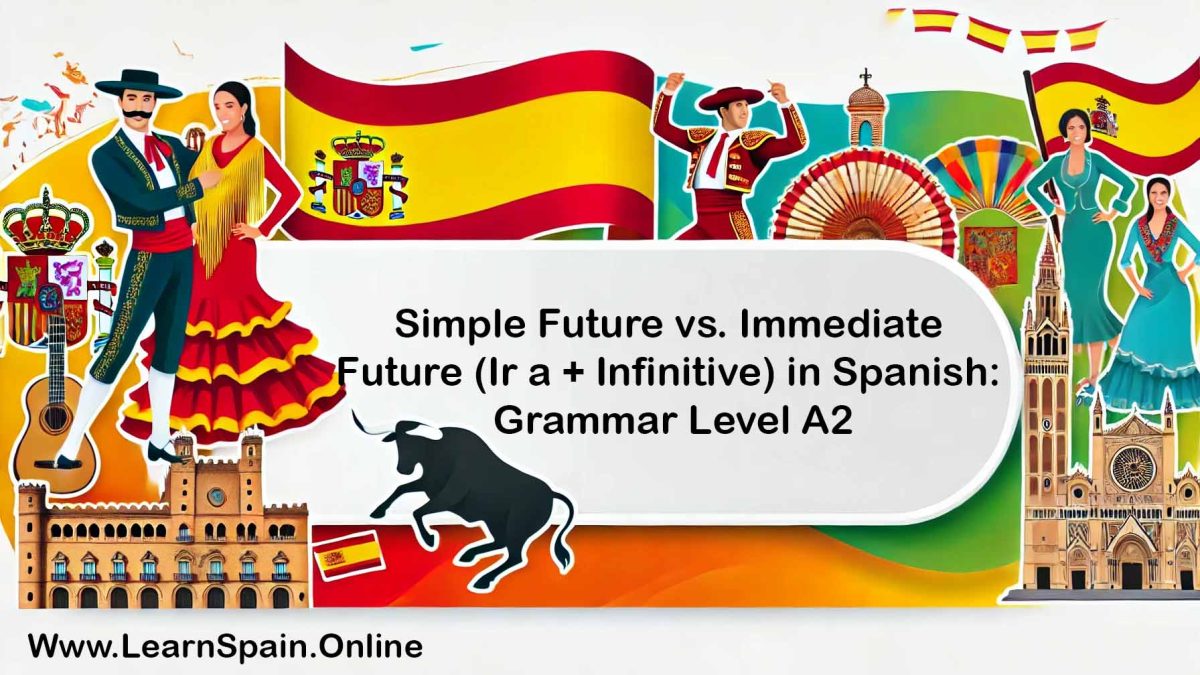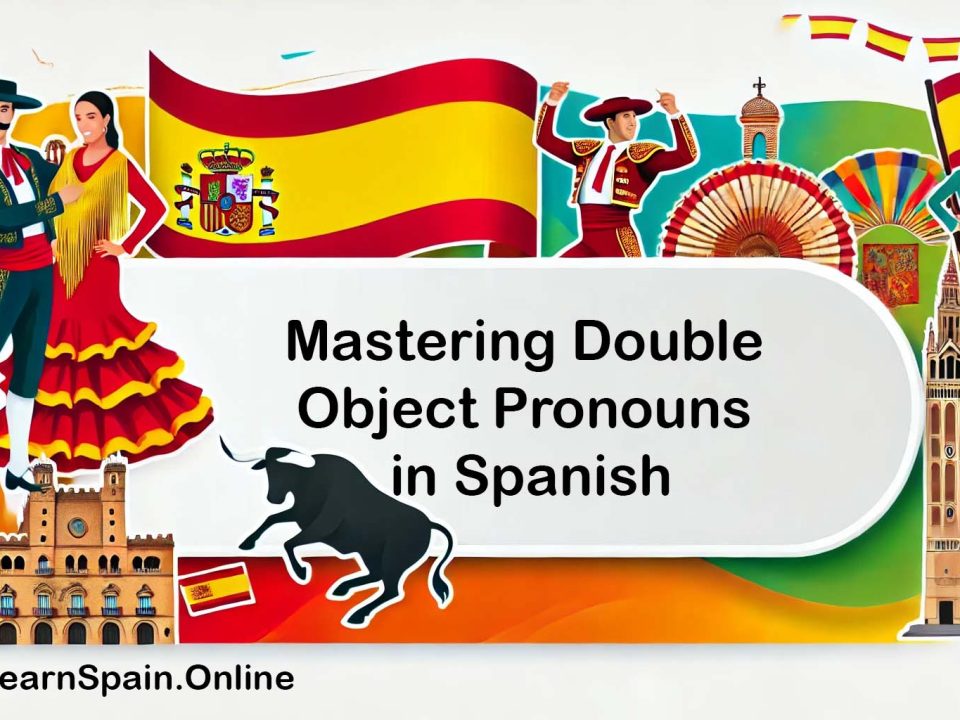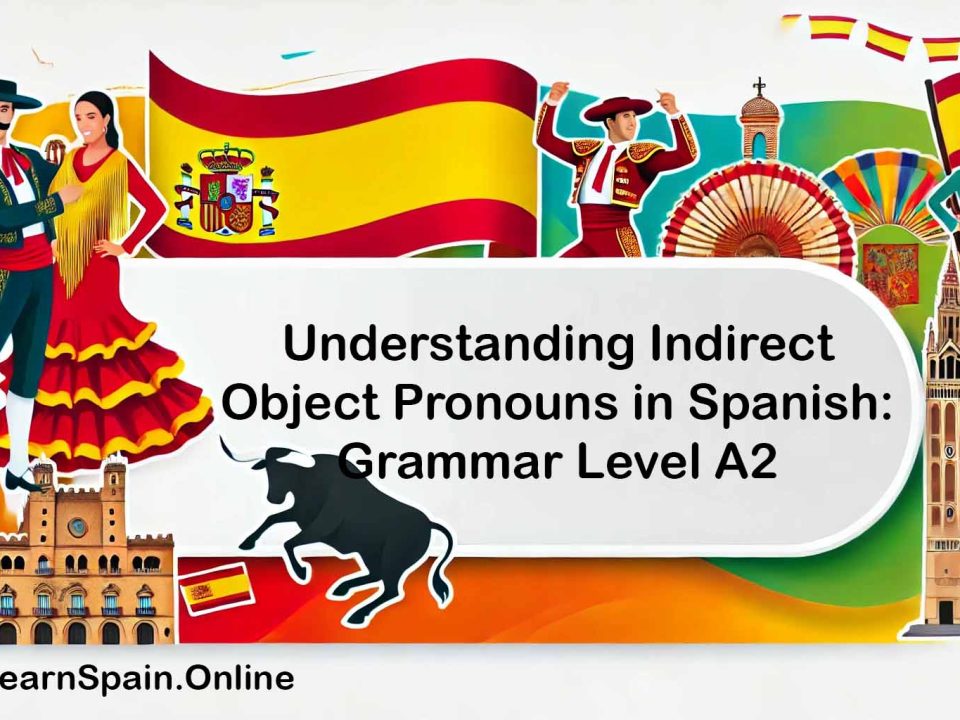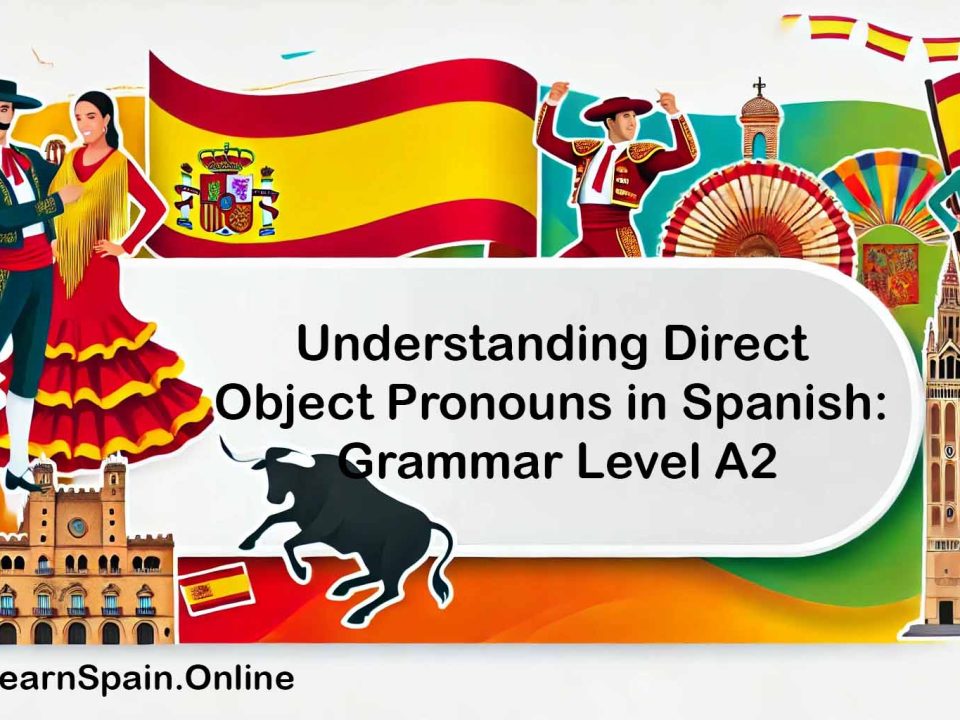
Forming Yes/No Questions in Spanish
August 6, 2024
Understanding Direct Object Pronouns in Spanish: Grammar Level A2
August 26, 2024Simple Future vs. Immediate Future (Ir a + Infinitive) in Spanish: Grammar Level A2
When learning Spanish, understanding how to talk about future events is essential. Spanish offers two main ways to express future actions: the simple future tense and the immediate future construction using “ir a + infinitive.” While both forms are used to describe actions that will happen, they have different nuances and uses. This article will delve into the differences between the simple future and the immediate future, provide examples, and explain when to use each form.
The Simple Future Tense
The simple future tense in Spanish is used to express actions that will happen at some point in the future. It is more formal and definitive than the immediate future, often used to describe events that are certain or planned in the long term.
Conjugation of the Simple Future
The simple future tense is formed by adding the following endings to the infinitive form of the verb:
- -é
- -ás
- -á
- -emos
- -éis
- -án
These endings are the same for all regular verbs, regardless of whether they are -ar, -er, or -ir verbs. Here are the conjugations for some regular verbs:
Hablar (to speak):
- Yo hablaré (I will speak)
- Tú hablarás (You will speak)
- Él/Ella/Usted hablará (He/She/You will speak)
- Nosotros/Nosotras hablaremos (We will speak)
- Vosotros/Vosotras hablaréis (You all will speak)
- Ellos/Ellas/Ustedes hablarán (They/You all will speak)
Comer (to eat):
- Yo comeré (I will eat)
- Tú comerás (You will eat)
- Él/Ella/Usted comerá (He/She/You will eat)
- Nosotros/Nosotras comeremos (We will eat)
- Vosotros/Vosotras comeréis (You all will eat)
- Ellos/Ellas/Ustedes comerán (They/You all will eat)
Vivir (to live):
- Yo viviré (I will live)
- Tú vivirás (You will live)
- Él/Ella/Usted vivirá (He/She/You will live)
- Nosotros/Nosotras viviremos (We will live)
- Vosotros/Vosotras viviréis (You all will live)
- Ellos/Ellas/Ustedes vivirán (They/You all will live)
Irregular Verbs in the Simple Future
Many common verbs are irregular in the simple future tense, meaning they do not follow the regular conjugation pattern. Instead, their stems change, but the endings remain the same as regular verbs.
Here are some of the most common irregular verbs:
Tener (to have):
- Yo tendré (I will have)
- Tú tendrás (You will have)
- Él/Ella/Usted tendrá (He/She/You will have)
- Nosotros/Nosotras tendremos (We will have)
- Vosotros/Vosotras tendréis (You all will have)
- Ellos/Ellas/Ustedes tendrán (They/You all will have)
Hacer (to do/make):
- Yo haré (I will do/make)
- Tú harás (You will do/make)
- Él/Ella/Usted hará (He/She/You will do/make)
- Nosotros/Nosotras haremos (We will do/make)
- Vosotros/Vosotras haréis (You all will do/make)
- Ellos/Ellas/Ustedes harán (They/You all will do/make)
Decir (to say):
- Yo diré (I will say)
- Tú dirás (You will say)
- Él/Ella/Usted dirá (He/She/You will say)
- Nosotros/Nosotras diremos (We will say)
- Vosotros/Vosotras diréis (You all will say)
- Ellos/Ellas/Ustedes dirán (They/You all will say)
Poder (to be able to):
- Yo podré (I will be able to)
- Tú podrás (You will be able to)
- Él/Ella/Usted podrá (He/She/You will be able to)
- Nosotros/Nosotras podremos (We will be able to)
- Vosotros/Vosotras podréis (You all will be able to)
- Ellos/Ellas/Ustedes podrán (They/You all will be able to)
Uses of the Simple Future
The simple future tense is used in several specific contexts:
- Expressing Future Actions:
- Mañana viajaré a Madrid. (Tomorrow, I will travel to Madrid.)
- El próximo año empezaremos un nuevo proyecto. (Next year, we will start a new project.)
- Making Predictions:
- Habrá una tormenta esta noche. (There will be a storm tonight.)
- Serás un gran médico algún día. (You will be a great doctor someday.)
- Expressing Possibilities or Guesses (Probability):
- ¿Dónde estará Juan ahora? (Where might Juan be now?)
- Serán las tres de la tarde. (It’s probably three in the afternoon.)
- Giving Commands or Instructions (Rarely):
- No matarás. (You shall not kill.)
- Estudiarás para el examen. (You will study for the exam.)
The Immediate Future (Ir a + Infinitive)
The immediate future in Spanish, formed with “ir a + infinitive,” is used to express actions that are going to happen soon or in the near future. It is often used in informal contexts and is similar to the English “going to.”
Conjugation of “Ir”
To form the immediate future, you need to conjugate the verb “ir” in the present tense, followed by the preposition “a” and the infinitive form of the main verb.
Conjugation of “Ir” (to go):
- Yo voy a (I am going to)
- Tú vas a (You are going to)
- Él/Ella/Usted va a (He/She/You are going to)
- Nosotros/Nosotras vamos a (We are going to)
- Vosotros/Vosotras vais a (You all are going to)
- Ellos/Ellas/Ustedes van a (They/You all are going to)
Examples of the Immediate Future
Here are examples of how to use “ir a + infinitive” in sentences:
- Voy a estudiar para el examen.
- I am going to study for the exam.
- Vamos a visitar a nuestros abuelos este fin de semana.
- We are going to visit our grandparents this weekend.
- Ellos van a comprar una casa nueva.
- They are going to buy a new house.
- ¿Vas a salir esta noche?
- Are you going to go out tonight?
- Mi hermana va a empezar su nuevo trabajo mañana.
- My sister is going to start her new job tomorrow.
Uses of the Immediate Future
The immediate future tense is commonly used in the following situations:
- Talking About Plans or Intentions:
- Voy a aprender español este año. (I am going to learn Spanish this year.)
- Ellos van a mudarse a una nueva ciudad. (They are going to move to a new city.)
- Describing Events That Are About to Happen:
- La película va a empezar en cinco minutos. (The movie is going to start in five minutes.)
- Va a llover pronto. (It is going to rain soon.)
- Making Predictions About the Near Future:
- Voy a ganar la carrera. (I am going to win the race.)
- Ella va a aprobar el examen. (She is going to pass the exam.)
- Expressing Commands or Instructions (Informally):
- Vas a hacer tu tarea ahora. (You are going to do your homework now.)
- Vamos a limpiar la casa. (We are going to clean the house.)
Comparing the Simple Future and Immediate Future
While both the simple future and the immediate future express actions that will happen, they are used differently depending on the context and the speaker’s intention.
1. Formality and Certainty:
- Simple Future: Often more formal and expresses certainty or a more distant future.
- Example: Construiremos una nueva casa el próximo año. (We will build a new house next year.)
- Immediate Future: More informal, often used in everyday conversations, and indicates a near future action.
- Example: Vamos a construir una nueva casa. (We are going to build a new house.)
2. Spontaneity vs. Plan:
- Simple Future: Can be used for spontaneous decisions made at the moment of speaking.
- Example: Está bien, lo haré. (Alright, I will do it.)
- Immediate Future: Often used for actions that have been planned or are about to happen.
- Example: Voy a hacerlo ahora. (I am going to do it now.)
3. Probability and Assumptions:
- Simple Future: Used to express assumptions, guesses, or probabilities.
- Example: Él estará en su casa. (He is probably at home.)
- Immediate Future: Typically not used for assumptions or probabilities.
- Example: Voy a suponer que está en su casa. (I am going to assume he is at home.)
Practice Exercises
To reinforce your understanding of the simple future and the immediate future, try the following exercises:
Translate the Sentences:
- I will study for the exam.
- Estudiaré para el examen.
- They are going to travel to Spain.
- Ellos van a viajar a España.
- We will see each other tomorrow.
- Nos veremos mañana.
- She is going to cook dinner tonight.
- Ella va a cocinar la cena esta noche.
- You will find a good job.
- Encontrarás un buen trabajo.
Complete the Sentences:
- Mañana __ (ir) a la playa. (Tomorrow, we are going to the beach.)
- Mañana vamos a ir a la playa.
- Ellos __ (tener) una fiesta este fin de semana. (They will have a party this weekend.)
- Ellos tendrán una fiesta este fin de semana.
- Nosotros __ (comprar) una casa nueva. (We are going to buy a new house.)
- Nosotros vamos a comprar una casa nueva.
- El próximo año __ (empezar) un nuevo proyecto. (Next year, we will start a new project.)
- El próximo año empezaremos un nuevo proyecto.
- Voy a __ (llamar) a mi mamá más tarde. (I am going to call my mom later.)
- Voy a llamar a mi mamá más tarde.
Conclusion
Understanding the differences between the simple future and the immediate future is crucial for expressing future actions accurately in Spanish. The simple future tense is often used for formal, certain, or distant future actions, while the immediate future (ir a + infinitive) is more informal and typically used for near-term plans or intentions. By mastering both forms, you will be able to communicate effectively about future events in various contexts. Regular practice and usage of these forms will help you become more confident in your Spanish language skills. ¡Buena suerte! (Good luck!)
Links:
Spanish Grammar
Spanish Vocabulary
Spanish Listening
Spanish Stories




1 Comment
[…] Simple Future vs. Immediate Future (Ir a + Infinitive) in Spanish: Grammar Level A2 […]